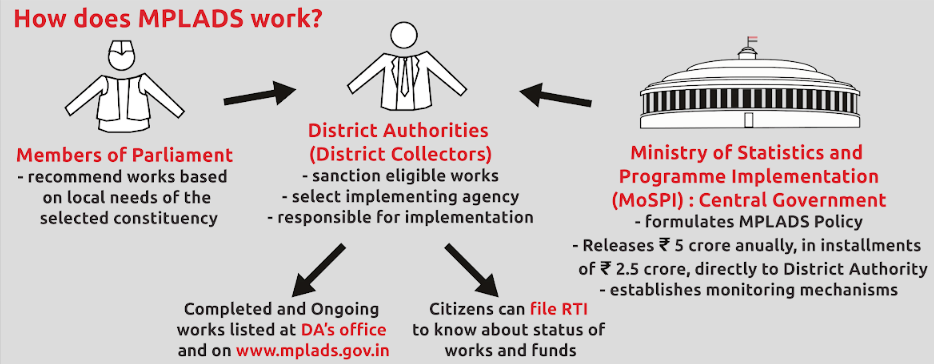MPLAD Scheme | 11 Nov 2021
Why in News
The Union Cabinet has approved the restoration of the Member of Parliament Local Area Development Scheme (MPLADS) for the remaining part of Financial Year 2021-22 till 2025-26.
- It will be co-terminus with the period of the 15th Finance Commission.
- The scheme was suspended for two financial years (2020-21 and 2021-22).
Key Points
- About:
- It is a Central Sector Scheme which was announced in December 1993.
- Objective:
- To enable MPs to recommend works of developmental nature with emphasis on the creation of durable community assets in the areas of drinking water, primary education, public health, sanitation and roads, etc. primarily in their Constituencies.
- Since June 2016, the MPLAD funds can also be used for implementation of the schemes such as Swachh Bharat Abhiyan, Accessible India Campaign (Sugamya Bharat Abhiyan), conservation of water through rain water harvesting and Sansad Aadarsh Gram Yojana, etc.
- To enable MPs to recommend works of developmental nature with emphasis on the creation of durable community assets in the areas of drinking water, primary education, public health, sanitation and roads, etc. primarily in their Constituencies.
- Implementation:
- The process under MPLADS starts with the Members of Parliament recommending works to the Nodal District Authority.
- The Nodal District concerned is responsible for implementing the eligible works recommended by the Members of Parliament and maintaining the details of individual works executed and amount spent under the Scheme.
- Functioning:
- Each year, MPs receive Rs. 5 crore in two instalments of Rs. 2.5 crore each. Funds under MPLADS are non-lapsable.
- Lok Sabha MPs have to recommend the district authorities projects in their Lok Sabha constituencies, while Rajya Sabha MPs have to spend it in the state that has elected them to the House.
- Nominated Members of both the Rajya Sabha and Lok Sabha can recommend works anywhere in the country.
- Significance of Restoration of the Scheme:
- It will restart fulfilling the aspirations and developmental requirements of the local community and creation of durable assets, which is the primary objective of the MPLADS.
- It will also help in reviving the local economy.
- Issues with MPLADS:
- Implementation Lapses: The Comptroller and Auditor-General of India (CAG) has flagged instances of financial mismanagement and artificial inflation of amounts spent.
- No Statutory Backing: The scheme is not governed by any statutory law and is subject to the whims and fancies of the government of the day.
- Monitoring and Regulation: The scheme was launched for promoting participatory development but there is no indicator available to measure level of participation.
- Breach of Federalism: MPLADS encroaches upon the domain of local self governing institutions and thereby violates Part IX and IX-A of the Constitution.
- Conflict with Doctrine of Separation of Powers: MPs are getting involved in executive functions.

